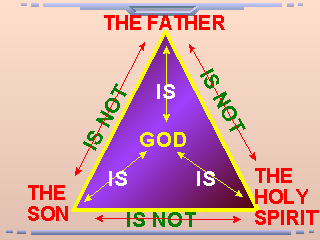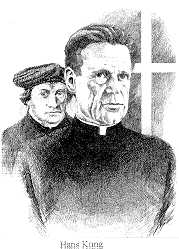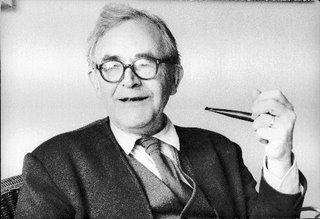
Biretta tip to Perry Robinson over at Energies.
Exploring the implications, challenges, and possibilities of being Catholic in the Third Millennium


B. Number 2.
C. Both statements are equally orthodox.



Barth does not deny that human freedom "cooperates" with divine grace. He denies that this cooperation in any way effects salvation. Although grace makes human freedom possible as a mode of acting (modus agendi), that freedom is always a gift. It is always imparted to faith in the mode of receiving salvation (modus recipiendi), partaking of it (modus participandi), and bearing witness to it (modus testificandi), never in the mode of effecting it (modus efficiendi). As imparted by the Spirit's miraculous operation, human freedom is always the consequence of salvation, never its cause, and therefore in its correspondence to grace always eucharistic (modus gratandi et laudandi) [p. 165].





'The existential moment of salvation (as established through the event of encounter) is, it is important to see, understood primarily in terms of vocation rather than justification or sanctification. Justification and sactification are primarily conceived, in Barth's theology, as the objective aspects of salvation to which vocation is the corresponding existential aspect. Thus as Barth moves into part 3 of volume 4 of Church Dogmatics, where vocation is discussed, a much more recurrent and prominent use of "in us" can be found than in parts 1 and 2, where justification and sanctification as they occur "in Christ" are the respective topics of discussion. Much earlier it was suggested that objectivism is understood as the external basis of personalism, and personalism as the internal basis or telos of objectivism. To this it may now be added that justification and sanctification, as Barth presents them, can be interpreted as the external basis of vocation, and vocation as the internal basis or telos of justification and sanctification. As the internal basis of the objective moment of salvation, vocation is thus understood as follows. The event of vocation takes place through an encounter established and effected by God. In this event the integrity of both the divine and the human partners is so carried through that the encounter is self-involving for each. The goal of vocation is conceived as fellowship (IV/3, 520-54), and its essence is conceived as witness (IV/3, 575). As the existential moment of salvation, vocation is thus a matter of encounter, integrity, mutual self-involvement, fellowship, and witness.'
--George Hunsinger, How to Read Karl Barth, pp. 154-5.

Everything depends on noticing that Barth is attempting to think this matter through concretely rather than abstractly in his special (actualist) sense of terms. Everything depends, therefore, on seeing that he does not think in terms of the real and the ideal, but rather in terms of the real and the unreal (or of the possible and the impossible). What is real, possible, and concrete is what God has established in Jesus Christ. In Jesus Christ we see that God does not exist without humanity and that humanity does not exist without God. God without humanity and humanity without God are conceived as abstractions that do not really exist in the sense that they have no ultimate reality. God does not exist without humanity, because God has decided in Jesus Christ not to be God without us. Likewise, humanity does not exist without God, because Jesus Christ has decided in our place and for our sakes not to be human without God. Everything else about us, as noted more than once before, is regarded as an abstraction that is destined to disappear. By virtue of an existential encounter with God, our old situation (abstract, unreal, and impossible as it is) can and should be left behind even now. The salvation which as such was already true and actual for us in Christ thereby becomes true and actual in our own lives as well. What was already effective and significant de jure becomes effective and significant de facto (however provisionally) here and now.
--George Hunsinger, How to Read Karl Barth, pp. 153-4.
 As a prelude to a thread that I want to begin on "Justification and Catholicity in the Third Millennium," I have re-produced the following quote from George Hunsinger's How to Read Karl Barth. This should lay a good foundation for the discussion to follow.
As a prelude to a thread that I want to begin on "Justification and Catholicity in the Third Millennium," I have re-produced the following quote from George Hunsinger's How to Read Karl Barth. This should lay a good foundation for the discussion to follow.The problem of how to relate the existential to the objective moment of salvation is one to which Barth finds himself returning again and again. Especially because he lays such great stress on the unconditional priority of the objective moment, he realizes that the integrity of the corresponding existential moment is in danger of being underplayed or even undercut. "Reality which does not become truth for us," he writes, "obviously cannot affect us, however supreme may be its ontological dignity" (IV/2, 297). A salvation, an ontological connection of Christ to us, that remained merely objective with no existential counterpart would be a salvation that remained inaccessible and hollow. Yet a salvation whose truth and reality somehow depended on our preparation, reception, or enactment would be salvation in which the existential moment was at some point (whether overtly and covertly) grounded in us rather than in Jesus Christ. When the reality of salvation becomes true for us, Barth argues, then at the same time we recognize that it was already true apart from us (and even against us). Whatever preparation, reception, or enactment may have been involved (and continues to be involved), our recognition is not to be conceived as in any sense constituting the truth or actuality of salvation. Our recognition is simply our awakening to the fact that, in Jesus Christ, salvation's truth and actuality really pertain and apply to us as well, that we are included in them, that they are real for us, precisely by having been established apart from us. Our awakening does not do anything to make salvation as such true or actual. It merely means that we have come to see that we are not outside but inside this saving truth and actuality. But precisely because we are inside and not outside, it is necessary that salvation also take place in our own life. When salvation does take place in our life, however, it is not the existential occurence that brings about the actuality and truth of salvation, but rather the actuality and truth of salvation that bring about the existential occurence. The existential occurence is manifesting, not a constituting, of salvation's actuality and truth.
--George Hunsinger, How to Read Karl Barth, p. 153


